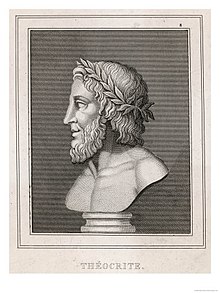 Theocritus (/θiːˈɒkrɪtəs/; Greek: Θεόκριτος, Theokritos; fl. c. 270 BC), the creator of ancient Greek bucolicpoetry, flourished in the 3rd century BC.
Theocritus (/θiːˈɒkrɪtəs/; Greek: Θεόκριτος, Theokritos; fl. c. 270 BC), the creator of ancient Greek bucolicpoetry, flourished in the 3rd century BC.Life
Little is known of Theocritus beyond what can be inferred from his writings. We must, however, handle these with some caution, since some of the poems (Idylls; Εἰδύλλια) commonly attributed to him have little claim to authenticity. It is clear that at a very early date two collections were made: one consisting of poems whose authorship was doubtful yet formed a corpus of bucolic poetry, the other a strict collection of those works considered to have been composed by Theocritus himself. [1]
Theocritus was from Sicily, as he refers to Polyphemus, the cyclops in the Odyssey, as his "countryman." He also probably lived in Alexandria for a while, where he wrote about everyday life, notably Pharmakeutria. It is also speculated that Theocritus was born in Syracuse, lived on the island of Kos, and lived in Egypt during the time of Ptolemy II.
The record of these recensions is preserved by two epigrams, one of which proceeds from Artemidorus of Tarsus, a grammarian, who lived in the time of Sulla and is said to have been the first editor of these poems. He says, "Bucolic muses, once were ye scattered, but now one byre, one herd is yours." The second epigram is anonymous, and runs as follows: "The Chian is another. I, Theocritus, who wrote these songs, am of Syracuse, a man of the people, the son of Praxagoras and famed Philina. I never sought after a strange muse." The last line may mean that he wrote nothing but bucolic poems, or that he only wrote in Doric. The assertion that he was from Syracuse appears to be upheld by allusions in the Idylls (7.7, 28.16–18).[1]
The information concerning his parentage bears the stamp of genuineness, and disposes of a rival theory based upon a misinterpretation of Idyll 7—which made him the son of one Simichus. A larger collection, possibly more extensive than that of Artemidorus, and including poems of doubtful authenticity, was known to the author of the Suda, who says: "Theocritus wrote the so-called bucolic poems in the Doric dialect. Some persons also attribute to him the following: Daughters of Proetus, Hopes, Hymns, Heroines, Dirges, Lyrics, Elegies, Iambics, Epigrams."[1]
The first of these may have been known to Virgil, who refers to the Proetides at Eclogue 6.48. The spurious poem 21 may have been one of the Hopes, and poem 26 may have been one of the Heroines; elegiacs are found in 8.33—60, and the spurious epitaph on Bion may have been one of the Dirges. The other classes are all represented in the larger collection which has come down to us.[1]
No comments:
Post a Comment